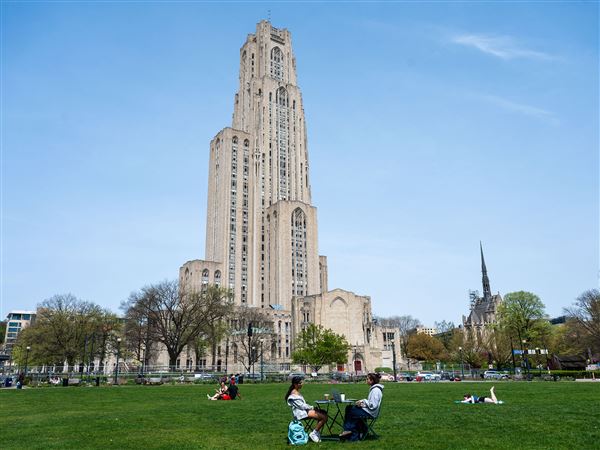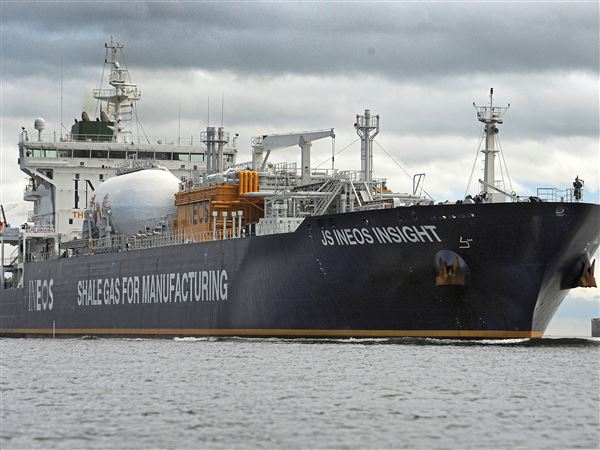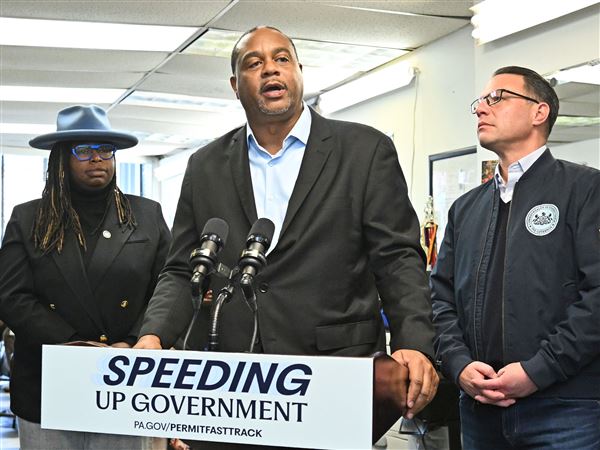Drivers likely will pay a bit more for gasoline but were spared any immediate increase in registration or driver's license fees in the transportation funding legislation signed today by Gov. Tom Corbett.
Mr. Corbett will attend three ceremonies to tout the bill's benefits, including an event this afternoon under the Liberty Bridge in Pittsburgh, a structurally deficient span upon which the weight limit was reduced this year. The legislation will advance plans for a $40 million to $60 million rehabilitation project that may begin in 2015.
A breakdown of what the legislation means for drivers and transit riders:
Wholesale gasoline tax
The legislation repeals the 12-cent-per-gallon tax levied at the pump and shifts gas tax collections to wholesalers by raising the Oil Company Franchise Tax rate and lifting an artificial cap on the tax.
The formula is complicated but will result in a net increase in the state gasoline tax of 9.5 cents per gallon starting Jan. 1; another 9.7 cents for 2015; and at least 8 cents for 2017.
It is not clear how that will affect pump prices, but if wholesalers pass on the entire 2014 increase, a motorist who drives 12,000 miles in a vehicle that gets 24 miles per gallon would pay $47.50 more next year.
If no other states raise their gasoline taxes, Pennsylvania will go from having the 15th-highest tax in the U.S. to the fifth-highest.
The Pennsylvania Department of Transportation believes comparisons to other states are flawed "since many states use other funding sources to pay for highways and bridges, so they keep their rates artificially low."
"In Pennsylvania, fuel taxes are used only for highway and bridge-related purposes and state police patrol functions. Income and sales taxes are not used to pay for state-maintained highways and bridges in Pennsylvania," the department said in a press release.
Registrations, driver licenses
The $36 annual registration and $29.50 license fee (paid every four years) won't change until July 1, 2015, when they will be increased by a percentage equal to any rise in the Consumer Price Index for all urban consumers over a two-year span. If recent inflation rates remain stable, the registration fee would increase $2 and the license fee $1.50 on that date, the first increases in the fees since 1997.
The fees will be adjusted for inflation every two years after that.
Drivers will have the option to register their cars for two-year periods instead of annually, by paying twice the annual fee. The tiny license plate stickers issued with registrations will be abolished.
County registration fee option
Counties will have the option to levy a $5 annual registration fee on vehicles registered to addresses within the county, starting in 2015. The fee would be added to and collected with the state fee, with the revenue returned to each county for local road and bridge projects.
In Allegheny County there were 942,000 vehicles registered as of the end of 2012, so the county could receive nearly $4.7 million per year if it imposes the fee. "It's something we would certainly take a look at," county Executive Rich Fitzgerald said.
Other vehicle fees
A host of other vehicle-related fees will increase next year. For example, the fee for a replacement driver's license will rise from the current $5 to $19, and the fee for issuance of a certificate of title will increase from the current $22.50 to $50, effective April 1.
Those considering the purchase of vanity plates will not want to procrastinate. The one-time fee will go up from the current $20 to $76, effective April 1.
Speed limit: 70
The maximum speed limit in Pennsylvania increases from 65 mph to 70 mph, but don't hit the accelerator just yet. PennDOT will need to do traffic and engineering studies on highways that could be considered for the higher limit, and hasn't yet adopted a timeline for such work, spokesman Rich Kirkpatrick said.
Road and bridge construction
According to an analysis released last week by Rep. Joseph Markosek, minority chair of the Appropriations Committee, the legislation will generate $242 million in additional road and bridge funding in the current fiscal year and $1.6 billion to $1.8 billion in the fifth year.
What it will ultimately mean is accelerated repair and rehabilitation of bridges and highways -- in other words, more orange barrels.
Dan Cessna -- PennDOT district executive for Allegheny, Beaver and Lawrence counties -- said he hasn't received notice of how much additional funding will be provided to the district but said the new money will pay for "a mix of resurfacing and bridge replacement, rehabilitation and preservation." It will allow rehabilitation projects at the Liberty and Birmingham bridges to be started sooner.
Public transit
Mr. Markosek's analysis said new revenue streams for transit will generate $49 million to $60 million statewide in the current fiscal year and $476 million to $497 million in year five.
The Port Authority of Allegheny County has not received estimates of the additional state revenue it should anticipate, spokesman Jim Ritchie said. But the agency's lurching from one financial crisis to another, and cutting service is clearly over.
"We now on Port Authority can predict for the next 10 years that we are going to have stable funding," Mr. Fitzgerald said. Businesses and residents who locate on transit lines "will know the transit line is going to stay there," he said. "That is a huge, huge thing for our economy."
The extra money will reduce pressure on the authority to raise fares, after three increases in the past five years that made its base fare the highest in the U.S.
Traffic fines
The people likely to be most impacted by the legislation are those who violate traffic laws. The fine for failure to obey traffic control devices, currently $25, will rise to $150, with much of the additional revenue going to public transit.
Surcharges that are applied to seven other types of moving violations, including speeding, will increase by 50 percent. The new fines will take effect Jan. 1.
Turnpike toll evasion
With the Pennsylvania Turnpike moving toward all-electronic toll collection, the legislation has a new section dealing with those who would try to beat the system by not having E-ZPass and removing, obscuring or blocking their license plate to avoid having it photographed.
A person who "intentionally or knowingly takes an affirmative action in an attempt to evade tolls incurred for travel" on the turnpike system would face a $3,000 fine.
First Published: November 25, 2013, 4:36 a.m.

















